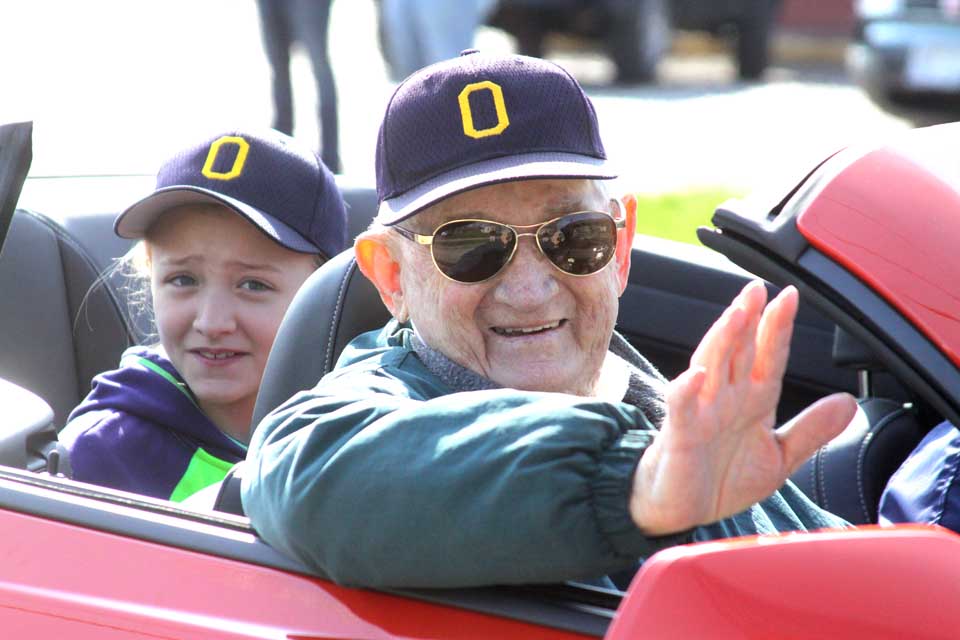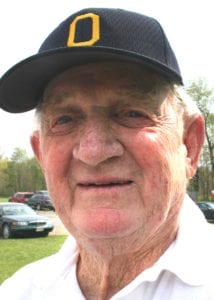IN MEMORIAM
Beloved ‘Doc’ Knapp Dies,
Oneonta Little League’s Hero

Editor’s Note: It is with sadness we learned that “Doc” Knapp, 90, one of a kind, a civic leader and hero of generations of Oneonta Little Leaguers, passed away today at Fox Hospital. His official obituary is being prepared by the Lewis, Hurley & Pietrobono Funeral Home – and, when ready, will be printed here – but this profile from 2010 captures Doc, the man, and his enduring legacy to the community.
By JIM KEVLIN • Reprinted from Hometown Oneonta, May 7, 2010

ONEONTA – The history of Oneonta Little League resides in one man, Oren “Doc” Knapp, (who’s also a pretty good golfer.)
So he knew of what he spoke when, after opening ceremonies Saturday, May 1, at, yes, Doc Knapp Field, at the end of Park Avenue, he said: “Oneonta has been very supportive of Little League. I’m very grateful to Oneonta for that.”
Yes, he ought to know.
When New York Telephone transferred him here from Stamford in 1952, he brought two young sons, Gary and John, with him, and was immediately absorbed into the fledgling Little League organization.
Bob Dwyer had been local League president since it was founding in 1948 at a meeting in the old Oneonta Hotel (Dick Fowler and Ken Chase were among those attending) and he was tired.
Doc, a baseball enthusiast since his boyhood on a Franklin farm, had looked forward to managing a team, but soon found himself drafted as Dwyer’s successor instead.
“I never did become a manager,” he said a little ruefully the other day, sitting on a picnic table behind the third-base dugout in the bright sun.
The number of teams, major and minor, has fluctuated over the years, but back then there were only four.
Bud Harrington coached the Police and Eggie Leach the Elks, two teams that still exist today.
Dom Mastro coached Angelotti’s and Jack Norton, Mountain Air, the other two.
The boys had been playing in Neahwa Park, but a dispute had arisen. The League needed money and wanted to sell banners to place in the outfield, but City Hall insisted the terms of the Neahwa Park bequest proscribed that.
Todd’s Strawberry Farm, off River Street, had recently moved, and Knapp got permission to build a diamond there.
One problem: The farm had taken the topsoil with it.
The League had no money to hire anybody, so Knapp, Dwyer, Jack Norton, Charlie LeSuer, Harrington, Mastro, Norton, Burl Scott, Al Palara and the rest of the guys got to work trying to make grass grow.
For years, players would pick up stones and pieces of asphalt during games there, although you wouldn’t know it seeing the quality of the turf today.
When they were done, the field was pretty simple – snowfences for outfield fences, for instance – but it was theirs.
“It was a dream come true,” said Knapp. The field was named in his honor when he stepped aside after 10 years at the helm.
Oren C. Knapp, now 83, was one of 11 children, and he figures by the time he came along his parents ran out of names. His namesake was the man who delivered him, Dr. Oren Sheney Tarbox, long an institution beyond Franklin Mountain.
As a boy, he adored Bob Feller, that farm boy from Nebraska who had made it to the Majors, and he absorbed all the training he could from Wendell Cooke, a notable coach in his hometown.
Knapp developed a pretty good arm, so good his younger brother wouldn’t catch for him any more, his catching hand hurt so much.
As Doc turned 17, however, Uncle Sam had other plans for him. He joined the Navy, and soon found himself on an LST in the Pacific, headquartered out of Hollandia in New Guinea.
He participated in the invasion of Leyte and other major operations, returned home safe, married Ethel, joined New York Telephone (he remained with the company 43 years), and they began raising a family.
(In addition to the two boys, the couple has a daughter, Sharon, now a lawyer; one of the boys is a banker, the other an engineer.)
When the boys were in high school, they joined the golf team, and dad found himself driving them over to the Red Pines course in Edmeston.
He got intrigued, tried it out, hit a good shot or two, soon was hooked, and developed a pretty good game. He’s hit three holes in one, and has won the Oneonta Country Club President’s Cup.
He credits all those years milking cows with giving him strong forearms.
After stepping down as League president, he remained active in promoting the Little League Foundation, established by attorney Henry Hulbert, (who also helped found SUNY’s Oneonta Foundation.)
Wilber Bank and the Dewar Foundation have been among its major benefactors.
“We had nothing,” Doc said, explaining his interest. The foundation now has about $100,000, and this year was able to donate $20,000 to build batting cages at Knapp Field.
About six years ago, things came full circle. Honored at a dinner at The Otesaga on his retirement from the Oneonta town Republican committee, Doc Knapp found himself sitting next to none other than Bob Feller, (now 91, he is the oldest members of the Baseball Hall of Fame.)
“He had a hand three times the size of mine.”


Thank you for sharing this again. My daddy was Uncle Doc’s younger brother and they were so close and looked like twins.
“Doc” Knapp was my Mother’s younger brother (thus, being my Uncle). If there was ever a man to look up to, it certainly was Uncle ‘Doc”. We have always been so proud of his devotion to his own family, his extended family, and to the City of Oneonta, especially the Little League system. God rest your soul, Uncle “Doc”, and may there always be Little League Baseball, both on earth and in heaven!